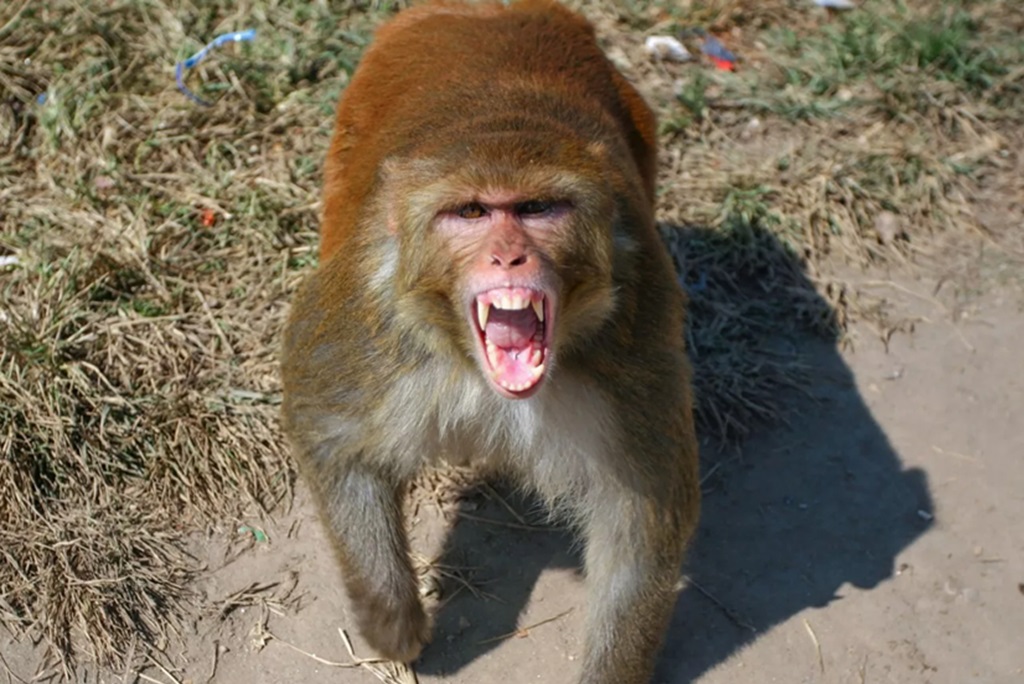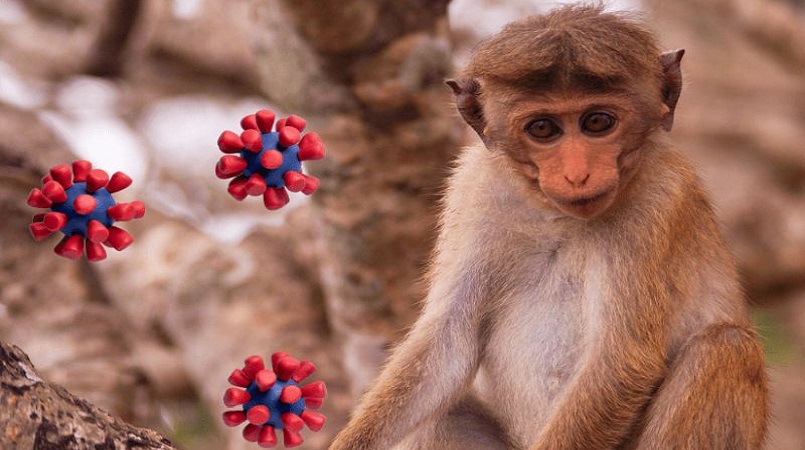Wildlife officials in Hong Kong have issues a warning to hikers to avoid agitating wild monkeys by eating in front of them, holding plastic bags, or establishing eye contact with wild monkeys. Adding that peoples interactions with the monkeys are well-intentioned, but not very helpful.
Mr. Shek Chung-tong, a senior conservation officer with Hong Kong’s Agriculture, Fisheries, and Conservation Department, issued the warning two days after a 37-year-old man was diagnosed as the city’s first human case of the lethal B-virus (Herpes virus B) following a monkey attack.
According to the Hospital Authority, the patient’s health improved from “critical” to “serious” on Friday morning.
“When visiting parks where monkeys live, you must first and foremost refrain from taking anything out to eat,” Shek told a radio programme.
“You’ll also be better off not carrying plastic bags or concealing your meals in backpacks. They may mistake you for withholding food from them based on their previous experience and attempt to seize it from you.”
Shek stated that staring the monkeys in the eyes would excite them, whereas approaching the animals would frighten or annoy them, causing them to overreact. He also described some locals’ decision to feed high-sugar items like apples and bananas to monkeys as “well-intentioned but ineffective.”
Such habits might harm the monkeys’ health and make them more habituated to seeking out human foods, the official said. The government stated that it had planted hundreds of thousands of trees in country parks throughout the years to provide food for monkeys.
For the past three years, reports of monkey disturbance have hovered between 200 and 300 per year, while reports of injury have ranged between five and eight.
The results show a dramatic decrease from 2006 and 2007, when the annual number of nuisance reports was approximately 1,000. Since 2007, the agency has entrusted the Ocean Park Conservation Foundation with performing contraception and sterilization operations on monkeys.
According to official estimates, over 70% of Hong Kong’s wild monkey population, or more than 1,900 animals, have become sterile. Shek said on Friday that the department planned to increase sterilization operations over the next five years, with an annual target of 100 to 120 monkeys.
On Wednesday, the city reported its first human case of the B virus. On March 21, the man was admitted to Tsuen Wan’s Yan Chai Hospital with a fever and diminished consciousness.
The virus, also known as the human simiae virus, can be transmitted to humans by macaques, a type of wild monkey found in Hong Kong, who naturally carry the disease in their saliva, urine, and stool.
According to authorities, a preliminary inquiry revealed that the patient had previously come into touch with wild monkeys and was hurt when visiting Kam Shan Country Park in late February.
Dr. Wilson Lam, head of the Hong Kong Society of Infectious Diseases, told the same radio programme on Friday that the virus was “very rare,” with just roughly 50 human illnesses and 21 deaths reported since its discovery in 1932.
“We don’t know the virus very well, but based on the limited data, if humans are in contact with the virus, there’s a high chance of infection,” he added. “It can have serious health consequences that affect the spinal nerves and central nervous system.”
Lam advised disinfecting bites and scrapes from wild monkeys as quickly as possible, ideally within five minutes. If disinfection was not possible right away, he recommended cleaning the wound with running water for 15 minutes.
“Disinfection has the potential to kill the virus, and washing it away reduces the viral load in the [monkey’s] fluids.” Otherwise, the pathogen might enter the body’s system,” he explained.
Lawmaker Steven Ho Chun-yin, who represents the agricultural and fisheries functional constituencies, stated that authorities’ education efforts and public understanding about the dangers of feeding monkeys needed to improve.
The Wild Animals Protection Ordinance prohibits feeding any wild animal in Hong Kong to prevent them from losing their capacity to forage in the wild. Anyone found guilty of breaking the legislation may face a fine of up to HK$10,000.
Herpes B virus, also known as Cercopithecine herpesvirus 1, is a rare but potentially lethal viral infection that mostly affects macaques. It can spread from monkeys to humans via bites, scratches, or contact with bodily fluids.
While unusual, human cases have occurred among persons who interact closely with these primates, such as researchers or veterinarians. Human symptoms are similar to those of herpes simplex, with the possibility of developing life-threatening encephalitis or serious brain damage if not treated. To avoid transmission of this dangerous zoonotic disease, take precautions when touching macaques.
Hong Kong Tourism Set to Reach Pre-Pandemic Levels By 2025








